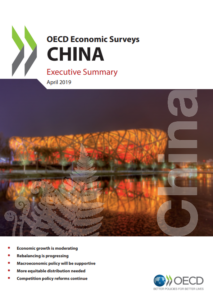The Chinese economy is still slowing down as it rebalances, with headwinds including trade frictions and a weak global economy undermining exports and creating new uncertainties. Policy should highlight long-term strategies to advance the economy towards improving economic efficiency and ensuring that future growth is sustainable, greener and more inclusive, a new report from the OECD says.
The latest OECD Economic Survey of China analyzes the factors behind the economic slowdown as well as policies that can enhance the quality of future growth and make sure that it is more equitably distributed. The Survey projects growth more than 6% this year and next, and sees continuing convergence with more advanced economies.
[smlsubform prepend=”GET THE SAFETY4SEA IN YOUR INBOX!” showname=false emailtxt=”” emailholder=”Enter your email address” showsubmit=true submittxt=”Submit” jsthanks=false thankyou=”Thank you for subscribing to our mailing list”]
The Survey also underlines the increasing financial risks from high corporate debt and suggests that China should prioritise the creation of a single product and labour market to advance productivity and inclusiveness.
China is at a crossroads, facing serious domestic and external challenges to maintaining its strong position over the long-term. Policy should seek to ensure a better functioning economy that delivers stable and inclusive growth for all
OECD Deputy Secretary-General Ludger Schuknecht, stated.
What is more, the report gives emphasis on the need for more balanced trade and investment. Policy should aim to reduce import tariffs and dismantle non-tariff barriers and barriers on the entry and conduct of foreign firms, and especially requirements to establish joint ventures or transfer technology.
A wise fiscal policy should channel funds to areas where returns are highest, and avoid mis-allocation of capital by enabling banks to better price risks. The quality, coverage and timeliness of fiscal reporting can be improved, the Survey noted.
Moreover, there is a wide scope to improve efficiency across the economy, especially by decreasing the internal barriers that damage product market competition and labour mobility. By improving the rule of law, restricting the power of administrative departments and providing clear and detailed implementation rules limiting their discretionary powers would reduce protectionism at the local level. In addition, anti-monopoly rules and enforcement can also be enhanced and public procurement processes could be made more transparent, as well as technology-neutral and open to all players.
Other measures to boost economic efficiency highlighted by the Survey incorporate:
- Stronger protection of intellectual property rights;
- Gradual removal of implicit guarantees to state-owned enterprises, allowing them to default;
- Reduction of state ownership in commercially-oriented, non-strategic sectors.
What is more, to make growth greener, the Survey recommends China to apply environmental regulations more strictly, increase fines for polluters and boost environmental taxation, particularly on fossil fuels.
Putting an end to the construction of coal-fired power plants and increasing investment in pollution treatment facilities, urban water treatment and rural sanitation is also necessary
the report concludes.
For more information click the following PDF
































































